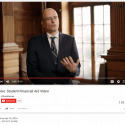On June 15, U of T Law quietly uploaded a video titled “Why Give: Student Financial Aid Video” to its YouTube account. In it, students Hana Dhanji (JD-MBA, 2017), Alvin Yau (JD, 2018), and Alissa Saieva (JD, 2017) share stories about their family histories. Hana and Alissa—but not Alvin—tell the viewer that they would not have been able to attend U of T Law without financial aid and they express their thanks to the law school’s donors. The video suggests that the official launch of the Faculty’s long-awaited financial aid fundraising campaign is imminent.
While the law school raised approximately $36 million for its new building since 2011, the overall financial aid pot has stagnated relative to ongoing tuition increases. The University of Toronto has increased first year tuition for the JD program 89% since 2006 (to $33,000 for 2015-2016), while the total financial aid pot has grown by only 43% over the same period. Ten years ago, bursary recipients received an average of approximately half of the $16,000 annual tuition. Last year, the average bursary amount was only one third of the $30,000 tuition.
When tuition increases began in earnest in the early 2000s under former Dean Ron Daniels, he committed to setting aside 30% of tuition increases to needs-based financial aid, but the Faculty has since abandoned this commitment. Dean Iacobucci has been clear that he sees fundraising playing the major role in funding financial aid. Dean Iacobucci was hired in part because of his fundraising abilities—the job posting advertising the position of Dean in 2014 stated that the Dean was expected to lead “fundraising and alumni efforts in order to enhance the Faculty of Law, in particular to generate student financial assistance to ensure accessibility and diversity.”
Dean Iacobucci has committed to increasing total available financial aid by the same percentage rate as tuition increases (currently capped by the province at 5% per year). However, this will not help close the gap that has grown over the last decade. Additionally, as Professor Ben Alarie has acknowledged in Faculty Council, the financial aid pot often ought to increase at a greater percentage rate than tuition if the Faculty wishes to simply maintain accessibility levels.
To date, the financial aid fundraising campaign has been in a quiet period while the Faculty has sought to cover cost overruns for the building project, and in the hopes of mitigating “donor fatigue.” At the October 2015 Faculty Council meeting, Assistant Dean of Advancement Chantelle Courtney said that her team was “building a case” with alumni, and commented that many alumni “don’t understand” how reduced growth in government funding affects the law school.
Some of the recent milestones in the campaign include:
- October 2015: Dean Iacobucci chaired Faculty Council’s annual discussion on tuition and financial aid. Iacobucci announced that he intended to seek a 5% increase in tuition for 2016-2017, making for tuition and fees of almost $35,000. Students’ Law Society President Andrew Wang presented several requests for the fundraising campaign, including that there be a contingency plan if fundraising does not meet targets (e.g. drawing on the endowment to maintain financial aid).
- December 2015: The administration began asking professors to donate to the campaign—essentially, to donate part of their salaries back to their employer. In a solicitation email, Professor Ben Alarie informs recipient professors about the tax benefits of donating and notes that “Ed has pledged that the law school will match from operating funds faculty giving on a 1:1 basis.”
- January 2016: Dean Iacobucci announced a fund endowed by himself and former U of T Law deans of $300,000, half of which was given by Dean Iacobucci’s father, former Supreme Court Justice Frank Iacobucci. Dean Iacobucci himself donated $25,000. Hal Jackman also donated a $450,000 fund for financial aid.
- February 2016: Director of External Relations Lucianna Ciccocioppo sent an email to selected students inviting them to participate in “an inspiring, heartwarming video focused on our incredible students [which] will really help to strengthen the campaign.” Most of the invitees that Ultra Vires is aware of were visible minority students.
The core message of the fundraising video seems to be that the student participants (at least Hana and Alissa) could not afford U of T Law tuition without financial aid, and therefore donors should give to financial aid. It remains to be seen how the campaign will be rolled out to donors, and what type of overall fundraising and budget plan the Faculty intends to pursue.






